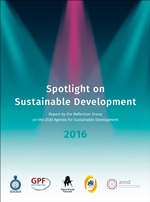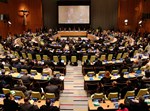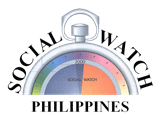Published on Wed, 2016-07-13 09:29
Civil Society Reflection Group launches Spotlight Report during the fourteenth session of the United Nations Conference on Trade and Development (UNCTAD 14),to take place in Nairobi, Kenya, from 17 to 22 July 2016. |
Published on Mon, 2016-07-11 17:15
The 2030 Agenda has the potential to correct the errors and omissions of the MDG approach to development, writes Jens Martens, from Global Policy Forum, in the introduction to this new report: “If taken seriously it has the potential to change the prevailing development paradigm by re-emphasizing the multidimensional and interrelated nature of sustainable development and its universal applicability.” But before this can be done, a number of obstacles need to be addressed. Can the 2030 Agenda be achieved without a global approach to taxes? Can it be assessed without promoting human rights and addressing the responsibilities of the rich and powerful? Can it be reviewed without effectively addressing climate change, illicit financial flows, conflicts, and trade and investment agreements? Can it be measured with a single number? With 300 such numbers? Or do we need a new kind of dashboard to monitor sustainability? |
Published on Mon, 2016-07-11 14:55
Are governments genuinely committed to implement the ambitious Agenda 2030 they adopted last September at the highest level? Will the global financial system and the trade and investment regime allow for the policy space needed to change course, eradicate poverty, reduce inequalities, protect nature and promote human rights? As the United Nations started this Monday, July 11 2016 its first review of the new Agenda and its 17 Sustainable Development Goals (SDGs), civil society coalitions from around the world brought to New York their own findings, demanding to be heard. |
Published on Mon, 2016-07-11 13:22
As the High-Level Political Forum (HLPF) convenes this week to review implementation of the Sustainable Development Goals (SDGs), CESR’s Kate Donald and Lena Kahler examine whether the new agenda will live up to its promise of promoting accountability and “leaving no one behind”. As the global follow up and review mechanism for the 2030 Agenda for Sustainable Development adopted at the UN nine months ago, the HLPF is where world leaders will take stock of countries’ SDG performance and address challenges in implementation. Yet serious doubts remain as to whether it will deliver on its mandate to “provide political leadership, guidance and recommendations on the Agenda's implementation and follow-up” as well as ensure accountability for the goals. |
Published on Sat, 2016-07-09 08:22
While more than 26.3 percent or about 27 million Filipinos live in poverty, the benefits from growth are concentrated in the hands of few billionaire families, the less than 1 percent who dominate the political economy. Tax injustice is imbedded in the system and unregulated corporate activities harm people and the environment. The Philippines can reduce inequality by changing the economic geography. We can reverse the big city-oriented development by supporting the provincial and local economies. We can do this by shifting from conventional, fossil fuel-intensive farming to organic and sustainable agriculture and by changing the pattern of public expenditure so that adequate resources, and authority, too, are deliberately transferred from the rich regions to the poorer ones. |
SUSCRIBE TO OUR NEWSLETTER






